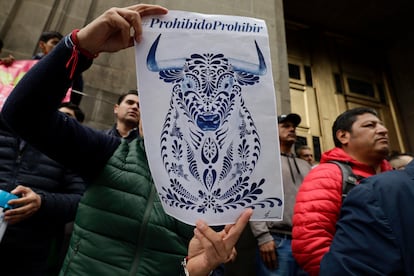The return of bullfighting to Plaza México, an exercise in freedom, culture and rebellion
The history of this long-established tradition is also the history of groups and people who have fought to have it banned

According to what Hernán Cortés described in his Fifth Letter addressed to Emperor Charles V, on June 24, 1526 he witnessed a bullfight in what is now the temple and former convent of San Francisco, in the historic center of Mexico City. Bullfighting arrived in what is currently the territory of Mexico 498 years ago, along with the language we speak today and the religion practiced by the majority of Mexicans. In fact, bullfighting is even older than the very Mexican cult of our Lady of Guadalupe.
In this almost half century, bullfights spread throughout the country, bullrings were built, Mexican bullfighters emerged, and bull ranching became a professional activity. A part of society became involved with this artistic activity, adopted its ethical and aesthetic values and assumed it as part of its own cultural heritage. Nowadays, many of the civil and religious festivities in different parts of the country have bullfights as a central part of their celebrations, and in some towns an interesting syncretism has emerged between bullfighting and their own popular traditions.
Therefore, based on this shared cultural heritage, it is possible to affirm that bullfighting groups can claim from the state and from society the right of access to culture and the exercise of their cultural rights. Not only that, but the continuous and orderly practice of bullfighting over time also implies the exercise of other fundamental rights, such as the free development of personality, the right to work, to trade and to free enterprise or freedom of artistic expression, to name just a few, which would have to lead to the possibility of carrying out and witnessing bullfights without obstacles.
However, the history of bullfighting has been accompanied by the history of groups and people who have fought for its prohibition. In the Mexican case, the attempts by prohibitionist groups traditionally took place through legislative means, with proposals for laws to outlaw bullfighting. Given the failure of this strategy, they chose to use the courts instead.
In this way, in May 2022, a civil association with no notable record in the defense of environmental rights or animal welfare, filed a claim for protection against bullfights in the borough of Benito Juárez, where Plaza México is located, claiming an argument that is unsustainable from our point of view: that bullfighting violates the right to a healthy environment. Fortunately for this association, they met with a crusading and obsequious judge who not only accepted their arguments, but also stretched his interpretation of the same and granted a precautionary measure suspending fights indefinitely, even as he refused to request a bond for the financial damages that this suspension could generate.
The Plaza México company, through its legal team, filed the corresponding appeal, which was reviewed by the Supreme Court of Justice, which in December 2023 unanimously resolved to revoke the suspension of bullfighting events in Benito Juárez, allowing bullfights to be held again while the court examines the core of the case.
The arguments raised in the Supreme Court ruling are very interesting, since on the one hand it considered that the association that filed the suit did not prove that the suspension of bullfighting activities would avoid imminent and irreparable damage to the rights which it claimed to defend and, on the other hand, the court determined that the suspension of bullfighting did constitute a restriction on the rights of people whose livelihoods are connected to these various activities.
And so, on Sunday, January 28, after 622 days, bullfighting resumed in Plaza México before a full crowd and a visible enthusiasm among fans, who were able to witness once again a spectacle that, according to prohibitionist groups, “no one is interested in anymore.” In this sense, the return of the bulls to Plaza México constitutes for the bullfighting industry not only an exercise in freedom and culture, but also, in these times where political correctness and cancel culture have taken center stage, an exercise of rebellion against groups that promote intolerance and single-track thinking.
Sign up for our weekly newsletter to get more English-language news coverage from EL PAÍS USA Edition
Tu suscripción se está usando en otro dispositivo
¿Quieres añadir otro usuario a tu suscripción?
Si continúas leyendo en este dispositivo, no se podrá leer en el otro.
FlechaTu suscripción se está usando en otro dispositivo y solo puedes acceder a EL PAÍS desde un dispositivo a la vez.
Si quieres compartir tu cuenta, cambia tu suscripción a la modalidad Premium, así podrás añadir otro usuario. Cada uno accederá con su propia cuenta de email, lo que os permitirá personalizar vuestra experiencia en EL PAÍS.
¿Tienes una suscripción de empresa? Accede aquí para contratar más cuentas.
En el caso de no saber quién está usando tu cuenta, te recomendamos cambiar tu contraseña aquí.
Si decides continuar compartiendo tu cuenta, este mensaje se mostrará en tu dispositivo y en el de la otra persona que está usando tu cuenta de forma indefinida, afectando a tu experiencia de lectura. Puedes consultar aquí los términos y condiciones de la suscripción digital.








































